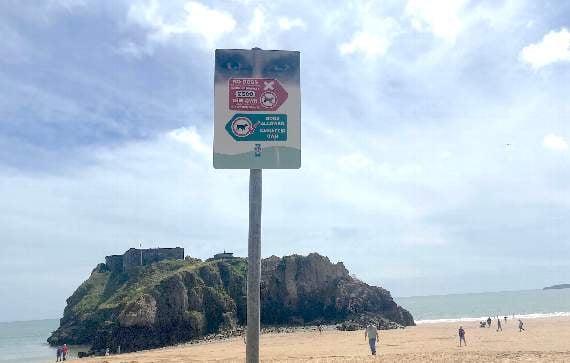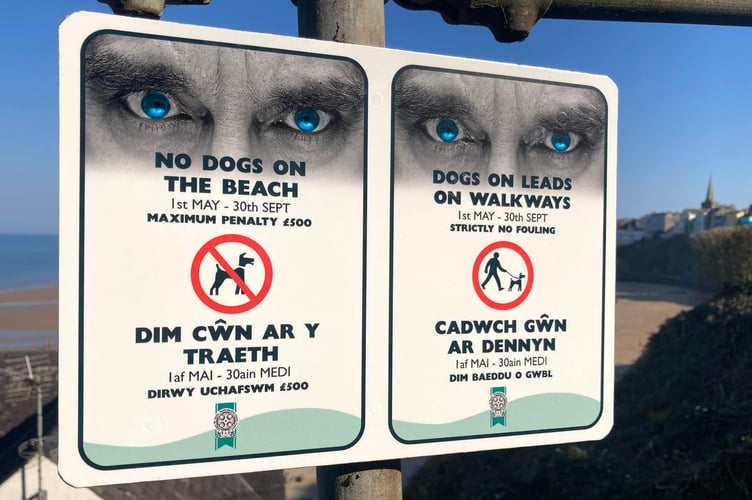With dogs being banned from some of Pembrokeshire’s beaches from this Thursday (May 1) until the end of September. the Local Authority are said to have instructed enforcement officers to ‘engage’ with offenders, rather than issue on the spot fines.
Pembrokeshire County Council are reminding dog owners of the beach bans in place over the summer, which runs for a full five months of the year, between May 1 and September 30.
Between these dates total dog bans are in place at Tenby North beach and Whitesands; while partial dog bans cover Lydstep, Newgale beach and pebble bank, Coppet Hall (voluntary), Saundersfoot beach and promenade, Tenby Castle and South Beach, Amroth beach and promenade, Poppit Sands, Broad Haven North and Dale.
However, last year there were reports of many people seen to be breaching the rules being handed £75 Fixed Penalty Notices by ‘overzealous’ WISE enforcement wardens - employed by PCC to tackle a range of environmental crimes - which now includes patrolling beaches for such breaches.

One visitor caught out last summer on Tenby’s South Beach, wrote to the Observer to voice their disgruntlement at what they described as a ‘brutal beach’ ban.
“Dog friendly Pembrokeshire?? Unfortunately, we were fined £75 for straying into an area that prohibits dogs,” they stated.
“As a result of the brutal beach restrictions, Tenby town is now constantly saturated with dog owners/walkers with hardly anywhere to walk their pets!
“However, many pubs etc will allow dogs into their premises and will take your money as they are aware of the value of the tourist’s money.
“I will of course pay my fine given to me by a smug enforcement officer but after holidaying in Tenby for over 55 years myself and my family will never return again.
“If you own a dog holidaying in Tenby from May to the end of September, it is a complete waste of time, effort and money.”
At a recent meeting of Pembrokeshire County Council’s Services Overview and Scrutiny Committee, members heard a council Task and Finish Group meeting had discussed updating the current procedure.
Regarding the dogs on beaches trial, the report for members said there would be an “intelligence-led” approach to tackle “hot-spots”.
If individuals are found with dogs within a restricted area, enviro-crime enforcement officers will undertake the following:
• Engage with the dog owners, issue a warning – full contact details will be taken.
• Dog owner will be requested to walk away from the restricted area – failing to do so will result in a FPN being issued.
• Dog owners will be asked to put their dog on a lead – failure to do so will result in a FPN being issued.
• Second offence after a warning will result in a FPN being issued.
• Dog fouling – FPN will be issued.
It concluded: “The view of the task and finish group was these measures would enable a trial season where education is given priority over enforcement, which could then be compared with the 2024 season of full enforcement.
“This will enable the committee to assess the two operating models when reviewed following the 2025 season.”
“Based on feedback received by members from users both residents and visitors, the view of the group was that a level of enforcement was required but to undertake a trial surrounding a blended approach associated with the issues of warnings for first-time offenders, combined with the issuing of fixed penalty notices where appropriate.”

It added: “This is only for dogs on beaches; dog fouling on the street and beach will continue to be enforced.”
It was recommended to take a three-fold approach - improvements in communication and visibility of the dog-free zones through a review of signage and visibility of enviro-crime officers; reviewing bylaws; and the trial of a new procedure surrounding the enforcement of dogs on beaches for 2025.
Speaking at the meeting, Cllr Rhys Jordan moved the recommendation, but said “blanket bans” on some of the county’s beaches were “overly punitive on dog owners,” adding: “Responsible owners do look after their dogs, but unfortunately it is the small minority; to have six or seven months of the year that certain beaches are completely banned from dogs is a bit much in my view.”
Committee chair Cllr Mark Carter said: “70% of those caught with dogs are tourists, I really think we’re sending out the wrong message; giving a warning is fair in my mind, it’s good for business and good for tourism; I’m very grateful to officers for getting this to this level.”
Members agreed to back the recommendations of the task and finish group.
Pembrokeshire County Council’s Cabinet Member for Residents Services, Cllr Rhys Sinnett said: “We are very lucky to have so many beaches where people can visit with their pets throughout the year.
“Dog restrictions are in place at some beaches during the summer period in order that everyone can enjoy their time by the sea.
“The beaches with partial restrictions still have dog exercise/walking areas – just please check the information boards.
“This summer we will be implementing an approach which focuses on education over enforcement.
“This means that while enforcement officers will be overseeing the restrictions locally, a warning will be issued for first offence in the first instance, rather than a fixed penalty notice (or FPN) – however, the dog owner will be requested to leave the restricted area promptly.
“However, FPN’s will be issued if someone repeatedly enters into the restricted areas with a dog following their warning or does not leave when requested by an officer. We hope this strikes a balance and thank dog owners in advance for their co-operation.
“We hope you enjoy the time outside with your dogs, however, please also support us by adhering to these restrictions.”


.jpeg?width=209&height=140&crop=209:145,smart&quality=75)


Comments
This article has no comments yet. Be the first to leave a comment.